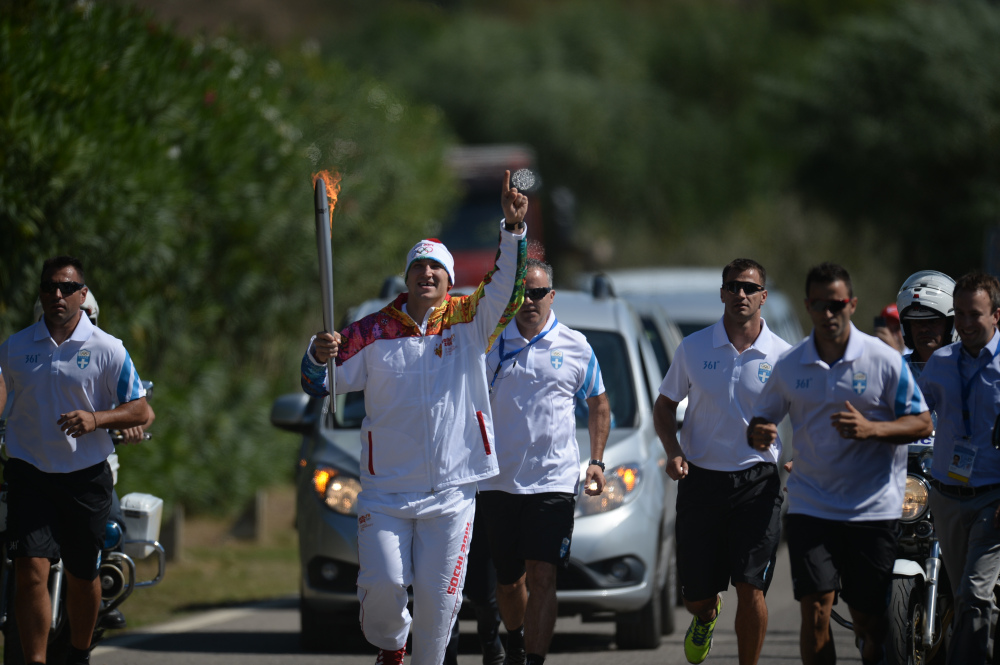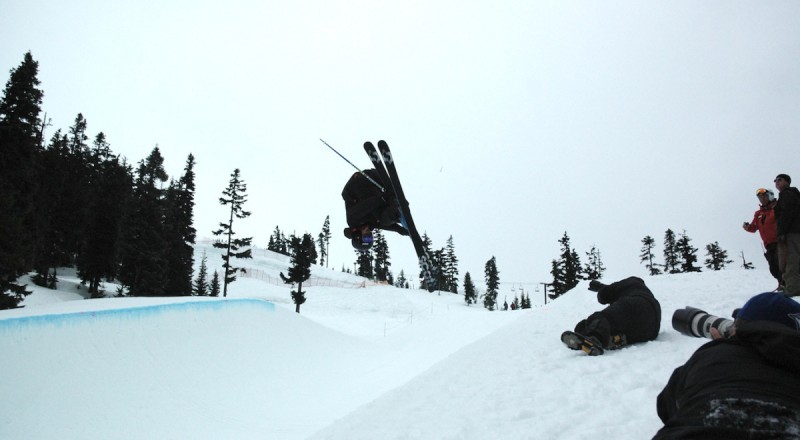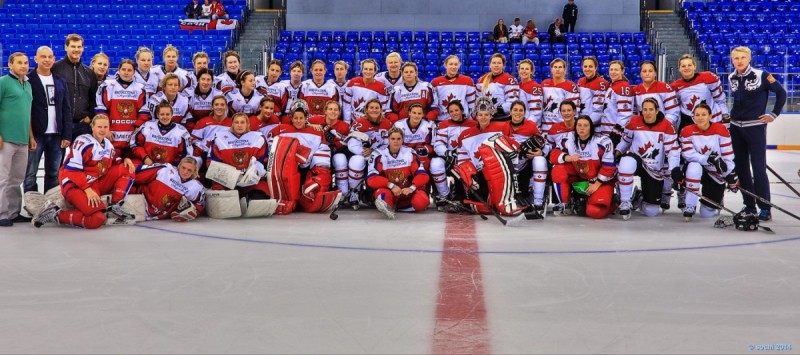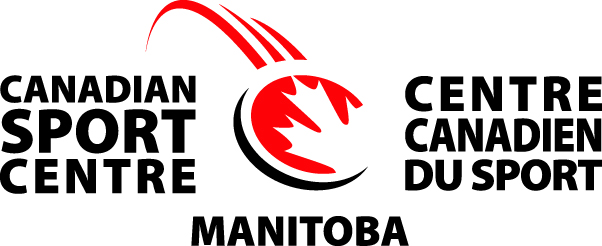
Hockey player Alexander Ovechkin carries the Olympic Torch in advance of the 2014 Winter Olympics in Sochi.
Into the mind of an Olympian
Alumna Dr. Adrienne Leslie-Toogood [PhD/01] is the director of sports psychology for the Canadian Sport Centre Manitoba, which is housed in the Frank Kennedy Building on the Fort Garry campus. UM Today gathered some questions from readers and brought them to her in the hopes of learning more about the mindset of Olympic athletes.
What do you try to do as a sports psychologist?
I always talk about managing your humanity. I think that as human beings we all have vulnerabilities and the more you can help an athlete to understand what their vulnerabilities are, how they want to prepare for it, the better they will be under pressure. There was a study done a few years ago that looked at the differences between athletes who consistently did well verse those who did not and they found that the ones who performed consistently well were much more aware of what distracted them. They had visualized working through the distractions and so when it happened, they were less affected. For me, that’s not all that mysterious. It makes perfect sense to me. If something is a threat to you, you pay more attention to it. That’s how you survive. So it’s not strange, it’s just helping people to learn how they react in critical situations and helping them learn how to respond differently.
Learning how to calm the body down, that’s also a big one. It’s hard to talk yourself into a calm place if your body is stressed out and heart rate is going crazy and you’re breathing poorly. So instead of talking yourself out of it you have to learn how to calm your body down.
But there’s really no such thing as a sports psychologist. I’m a psychologist who just happens to work with this population. So I’m more aligned as a psychologist first. I’m helping the human first so the human can do this sports stuff under pressure.
What are Olympic athlete’s biggest fears?
That’s a tough question to answer because it’s very individual and depends on a lot of factors. Everyone going in to the Olympics has different expectations – some are expecting to medal, some aren’t – and everyone handles that pressure differently. I think that ultimately a big fear is that they won’t perform as well as they hope. Athletes invest a lot time in getting to an Olympic games and they want to have the best performance there. Being afraid of letting down spectators and families is something that would potentially run through an athlete’s mind. But since Canada created the Own the Podium program for the Vancouver Olympics, there has been a much more professional approach to sports and athletes – I think – feel much better prepared to perform in those pressure situations.

Canadian freeskier Rosalind Groenewoud, who was a close friend and teammate for seven years of deceased Sarah Burke, the freestyle skier Groenewoud considers her inspiration.
How do you prepare your athletes to block out distractions of safety concerns and the like?
If you look at the Canadian sport system you’ll see they have developed a model to try and minimize that. For instance, Manitoba athletes compete in the Manitoba games – their first multi-sport games. Then they go to Canada Games and then you get to international multi-sport games. So young athletes are being exposed to these things early on and you work with them to get them to understand their roles – their role isn’t to worry about athletes villages or meals, that’s a coaches and support staff job – their job is to focus on performing their best. They focus on their process, doing all the little tasks that they know they need to do – skiing this gate right, and that gate right. The more they and their team are locked into that process, the fewer distractions come into play.
>> See the CBC report by Peter Mansbridge on Pushing the Limits in winter sport.
Do they have different mental training for the Olympics than other events?
Yes. The Olympics are a different beast and we need to prepare athletes differently for them. Prior to Vancouver, that’s something we weren’t doing a great job of. The Olympics are different. There is more pressure because the world is watching, especially when you think of some winter sports that, outside of the Olympics, very few follow. And even when you think of some of the X-Games sports that are coming in, suddenly the world is watching you. For sure they are different and now we are paying more attention to the fact that they are different, and we’re bringing in new tools, like bio-neural feedback, to help athletes manage them.
Do they ever feel used by corporate sponsors?
I’d say no. Athletes are pretty thankful for sponsorships that help them train. I’ve never come across this.
Do athletes ever get concerned about being bested by a cheater?
When I spend my time with my athletes all we talk about is stuff they have control over. Athletes are focused on things that make them become better and that doesn’t seem to fit in that category.
>> Canadian athletes on becoming an Olympian
Are the Olympics worth all the sacrifices?
That’s an interesting question and I’m a firm believer that you have to enjoy life along the way so I would be hopeful that when an athlete gets to the Olympics, it’s not like they have sacrificed a ton. I’d hope they enjoyed the journey along the way. So that’s the framework I would encourage.
I think we’ve done wrong if an athlete has given up everything in his or her life for that experience because, well, they experience more failure in their lives than probably any other group of people on Earth. We better help them learn and grow through those experiences to help keep them healthy. So I hope that as a system we’ve helped them to train really hard – because that’s an unbelievable thing to push your limits beyond your comfort zone, but that we also provide them resources so that it’s an enjoyable process.

The Canadian Women’s Hockey Team, currently ranked number 2 after going down to the USA team in last year’s World Championships, includes Manitoban Jocelyne Larocque.
How do athletes deal with the pressure of having only once chance every four years to compete?
I have a lecture series I host once every couple of years and at the last one we brought in Marcel Lacroix (now a coach), he led the long track speed skating program into Vancouver, and his mantra was “Today, Not Tomorrow” with those athletes for that reason. We really work with them to be the best they can be today. It’s so easy in a training session if you’re not feeling well to not fully engage. And you may be at a competition where you’re not feeling 100 per cent but it’s important that you put forward your best effort on that day regardless of how you’re feeling. Ultimately, sure, you could have the flu or something else ailing you, but whatever state you’re in, you have to be the very best you can be in that state.
>> Even coming back after double surgery, it’s exciting: freestyle skier Rosalind Groenewoud on the Half Pipe
>> If you’re only 20, you don’t sweat it: Mark McMorris, Snowboard slopestyle
What if they lose?
As I mentioned before, failure is a huge part of a high-performance athlete’s life. At an Olympic games, three people win and most people lose. So it’s a very important part of a plan. I’m going to respond a very random, circuitous way.
Maya Angelou wrote an autobiography – Wouldn’t Take Nothing for My Journey Now – and she also has this poem I Know Why the Caged Bird Sings, and they epitomize what we are trying to get these athletes to do, and ultimately how we want everyone to live their lives. But on her book tour for her autobiography someone asked if she wished some of the things she wrote about never happened. And she reflected and said no, she wouldn’t wish away any of those things because those experiences are what created this strong woman you see before them today. And in working with athletes, that’s definitely my conceptual framework: at the end of the day, when that race or competition is over, it’s not about whether you win or lose it’s about the lesson you can learn from that experience and how that experience is going to make you strong down the road. So I think a big mistake we commonly make is we don’t have an adequate debriefing process for them.
>> Canadian expected Olympic medal projection: More than previous
>> Canadian’s Mens Hockey: Biggest Hurdles for Sochi
>> Home ice advantage? Alex Ovechkin and Evgeni Malkin on Sochi
>> Medal hopes and championship dreams: Canada’s largest Winter Olympics team ever
Colleagues took swimmers who were expected to qualify for the Olympics but didn’t, and they put then in a Functional MRI and they found their brains were in a depressed state. And through adequately debriefing that athletes, and working through it – like watching the video and talking about what went wrong and how to do things differently — they were able to lift that and help them get to a better place. So we have to talk about their failed experience. We don’t want skeletons in the closet, we want rich life experiences.
I also think if you invested your heart and soul in to something and it doesn’t go well, you better draw some lessons otherwise it’s going to be too hard to move on. The bigger the loss and the bigger the failure, the more you need to learn so you can move on and forgive. If you can’t learn from failure, you’re not ready to be a high performance athlete because you’re going to fail way more than you’re going to succeed, that’s for sure. Everyone is trying to be the best in the world at something and you’re not going to be the best every day. It’s going to be absolutely devastating some days and you better have a plan for dealing with that.








